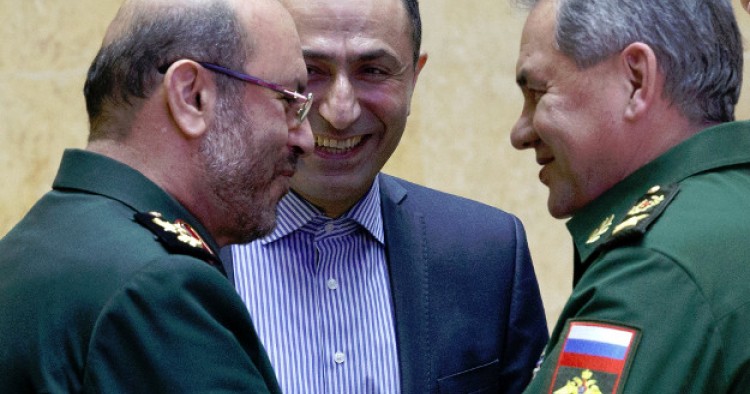Iranian Defense Minister Hossein Dehghan today had separate phone conversations with his Russian and Syrian counterparts and warned that the United States should pay a heavy price for any future attacks against the regime of Iran’s ally Bashar al-Assad in Syria, the Iranian media reported. According to Fars News Agency, which is affiliated with the Islamic Revolution Guards Corps (I.R.G.C.), Dehghan and Syrian Defense Minister Fahd Jassem al-Freij discussed ways to further enhance military cooperation between the two countries and agreed to step up military operations against rebel groups fighting in Syria. The two leaders also emphasized that the latest U.S. strikes against a Syrian army air base would have “no impact on the decision and determination of the resistance front to fight terrorists.”
Dehghan also spoke with Russian Defense Minister Sergey Shoygu earlier today. According to the public relations directorate of the Iranian Defense Ministry, the two leaders decided to intensify joint military efforts to inflict “decisive and crippling blows” to militant groups fighting the Assad regime. “Terrorists must understand that they cannot continue their criminal life. Americans also should pay a heavy price for repeating such actions and realize that their actions will not go unanswered,” Dehghan reportedly said. “The resistance front, with all its power and firm determination, will continue counterterrorist measures despite what America wants,” he pledged to the Russian top defense official.
Comment: The U.S. missile strikes last Friday that targeted a Syrian air force base in retaliation for a chemical attack against civilians in northern Syria took Tehran by surprise. This is because the Obama administration had refused to take any military action against the Syrian regime despite previous acts of atrocities by Damascus and its Russian and Iranian allies in the past. After the fall of Aleppo into the hands of the Syrian army and Iran-controlled militiamen in December, Iranian leaders have been claiming victory in Syria over the United States and its regional allies. But the U.S. attack has caused concern among Iranian leaders that their gains may be in jeopardy if the attack was a prelude to a wider U.S. military involvement in Syria.
So far, Iran’s political and military leaders have sufficed with verbal condemnation of the U.S. attack and refrained from any retaliatory measures. But in the meantime, Tehran has been trying to take advantage of the incident to further strengthen its ties with Moscow and consolidate its dominance on the Syrian battlefield. The Islamic Revolution Guards Corps (I.R.G.C.) commands a powerful alliance of tens of thousands of Lebanese, Iraqi, Afghan and Pakistani militia groups that wield significant influence on the Syrian battlefield. As Dehghan’s remarks show, Tehran will most likely increase the number of I.R.G.C. personnel in Syria and step up support for its proxies in the country in the near future.
The Middle East Institute (MEI) is an independent, non-partisan, non-for-profit, educational organization. It does not engage in advocacy and its scholars’ opinions are their own. MEI welcomes financial donations, but retains sole editorial control over its work and its publications reflect only the authors’ views. For a listing of MEI donors, please click here.













